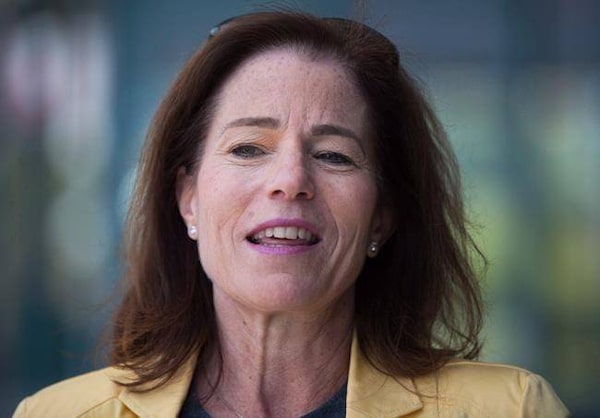
B.C. Municipal Affairs Minister Selina Robinson in Coquitlam, B.C., on May 7, 2017.Darryl Dyck/The Canadian Press
After announcing changes to provincial campaign financing, the NDP government has turned to municipal politics with plans to limit donations to local candidates and parties, and to ban corporate and union donations as well.
The revisions, announced Monday by Municipal Affairs Minister Selina Robinson, will also ban donations from outside the province to local politics. They all come ahead of municipal elections in B.C. in October, 2018.
"This is about getting big money out of local elections, getting it out of our politics so that it's people's voices that are heard, people's energy and not the support of larger corporations or unions or wealthy donors," Ms. Robinson told a news conference at the legislature.
Donations to local politics and candidates will be limited to $1,200 a voter each year – the same as for provincial politics – under the pending changes to the Local Elections Campaign Financing Act.
A donor's total donations to a campaign and its endorsed candidate cannot exceed $1,200.
The changes, long sought by the Union of B.C. Municipalities (UBCM), representing more than 150 communities across the province, applies to all local elections starting with the 2018 general municipal elections and by-elections after that.
Loans to candidates or electoral organizations will also be limited to $1,200 a year.
The NDP government is maintaining local-election expense limits passed in 2016, when the BC Liberals were in power, at $10,000 for mayoral candidates and $5,000 for other candidates in communities with fewer than 10,000 people. For communities with more than 10,000 people, expense limits are to be calculated on a per capita formula.
Once passed, the changes will be retroactive to Oct. 31, 2017, the day after the first reading of the legislation. However, the government said in a statement that contributions allowed under the former rules and received before Oct. 31 of this year can be used for local elections in 2018.
UBCM president Wendy Booth said on Monday the organization repeated its call for these changes as recently as their annual convention last month in Vancouver.
"Elections shouldn't be won or lost on whoever has the most money," Ms. Booth told the news conference at the legislature.
However, the province will not be offering subsidies for local politics. That measure, at the provincial level, has caused considerable controversy, but Ms. Robinson noted Monday that public financing has never been part of municipal politics in B.C.
BC Liberal Todd Stone offered some praise for the NDP plans. "This is a good step forward and levelling the playing field for all campaigns on both levels of government. British Columbians wanted big money out of politics and we support that," Mr. Stone said in a statement. "We're pleased the minister did not incorporate taxpayer funded subsidies into local election campaigns."
He added, "We look forward to reviewing this bill to ensure we are holding it to the same level of account as we are holding the government's other proposed legislation on campaign finance reform."
Andrea Reimer, a veteran councillor for the Vision Vancouver party that now has a majority on Vancouver city council, said in an interview that she was elated at Monday's news because she has been working on the issue for some time.
Ms. Reimer, last week, announced she would be focusing on campaign finance ahead of her planned departure from local politics with next year's municipal elections.
She said that, as details on the NDP's plans were released Monday, some constituents were complaining that the donation limits were too high or low. "It's not perfect, but it's like going from the early dark ages all the way up to the turn of the last century in one giant jump," she said. "The reality is we just need limits and to get on with it."
Ms. Reimer said she expected all municipal parties will adjust their approach to managing donations, and Vision is ready for the change. "It's a day that we have planned for," she said. "We have a pretty strong support base of smaller, individual donors and lots of volunteers and that will be a good structure moving forward."
 Ian Bailey
Ian Bailey